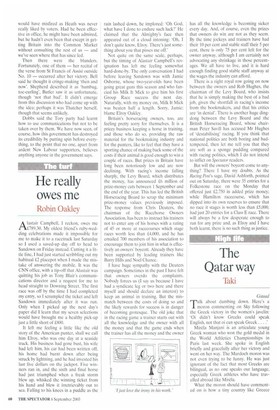He really owes me
Robin Oakley
Al:stair Campbell, I reckon, owes me 789.30. My oldest friend's ruby-wedding celebrations made it impossible for me to make it to a racetrack last Saturday so I used a saved-up day off to head to Sandown on Friday instead. Cutting it a little fine, I had just started scribbling out my habitual £2 placepot when I made the mistake of answering the mobile. It was the CNN office, with a tip-off that Alastair was quitting his job as Tony Blair's communications director and a request for me to head straight to Downing Street. The first race was off by the time I had completed my entry, so I scrumpled the ticket and left Sandown immediately after it was run. Only when I picked up the next day's paper did I learn that my seven selections would have brought me a healthy pick-up just a little short of £800.
It left me feeling a little like the old story of the American punter, shall we call him Elroy, who was one day at a seaside track. His business had gone bust, his wife had left him, his car had been written off, his home had burnt down after being struck by lightning, and he had invested his last five dollars on the jackpot. Five winners ran in, and the sixth and final horse had just triumphed when a freak storm blew up, whisked the winning ticket from his hand and blew it irretrievably out to sea. Falling to his knees in a puddle as the rain lashed down, he implored: 'Oh God, what have I done to endure such luck?' He claimed that the Almighty's face then appeared out of a cloud intoning: Oh, I don't quite know, Elroy. There's just something about you that pisses me off.'
Not quite on the same scale, perhaps, but the timing of Alastair Campbell's resignation has left me feeling somewhat hard-done-by. The only conversation I had before leaving Sandown was with Jamie Osborne, whose two-year-olds have been going great guns this season and who fancied his Milk It Mick to give him his first Group Race success the next day. Naturally, with my money on, Milk It Mick was beaten half a length. Sorry, Jamie; blame Elroy Oakley.
Britain's horseracing owners, too, are feeling pretty sorry for themselves. It is a pricey business keeping a horse in training, and those who do so, providing the raw material for the bookmaking industry and for the punters, like to feel that they have a sporting chance of making back some of the costs if their animal is good enough to win a couple of races. But prizes in Britain have long been notoriously low and are now declining. With racing's income falling sharply, the Levy Board, which distributes the money, has announced £6 million of prize-money cuts between I September and the end of the year. This has led the British Horseracing Board to scrap the minimum prize-money values previously imposed. The response from Chris Deuters, the chairman of the Racehorse Owners Association, has been to instruct his trainers not to enter any of his horses with a rating of 45 or more at racecourses which stage races worth less than £4,000, and he has emailed 700 members of his association to encourage them to join him in what is effectively an owners' boycott. Already they have been supported by leading trainers like Barry Hills and Noel Chance.
I have huge sympathy with the Deuters campaign. Sometimes in the past I have felt that owners overdo the complaints. Nobody forces us (I say us because I have had a syndicate leg or two here and there myself and should declare an interest) to keep an animal in training. But the mismatch between the costs of doing so and the likely rewards for success is in danger of becoming grotesque. The old joke that in the racing game a trainer starts out with all the knowledge and the owner with all the money and that the game ends when the trainer has all the money and the owner
has all the knowledge is becoming sicker every day. And, of course, even the prizes that owners do win are not as they seem. By the time jockeys and trainers have had their 10 per cent and stable staff their 5 per cent, there is only 75 per cent left for the owner anyway, although I am certainly not advocating any shrinkage in those percentages. We all have to live, and it is hard enough finding good stable staff anyway at the wages the industry can afford.
There is a right royal row going on now between the owners and Rob Hughes, the chairman of the Levy Board, who insists that he is simply making the best of a bad job, given the shortfall in racing's income from the bookmakers, and that his critics are 'in denial'. There is another huge dingdong between the Levy Board and the British Horseracing Board, whose chairman Peter Savill has accused Mr Hughes of 'destabilising' racing. If you think that national politics are both boring and badtempered, then let me tell you that they are soft as a sponge pudding compared with racing politics, which I do not intend to inflict on Spectator readers.
But will the owners' boycott come to anything? There I have my doubts. As the Racing Post's sage, David Ashforth, pointed out on Saturday, there were 35 entries for a Folkestone race on the Monday that offered just £2,750 in added prize money; while Hamilton racecourse, which has dipped into its own reserves to ensure that no race it stages is worth less than £5,000, had just 20 entries for a Class E race, There will always be a few desperate enough to run for any prize and, as Elroy and I have both learnt, there is no such thing as justice.










































































 Previous page
Previous page